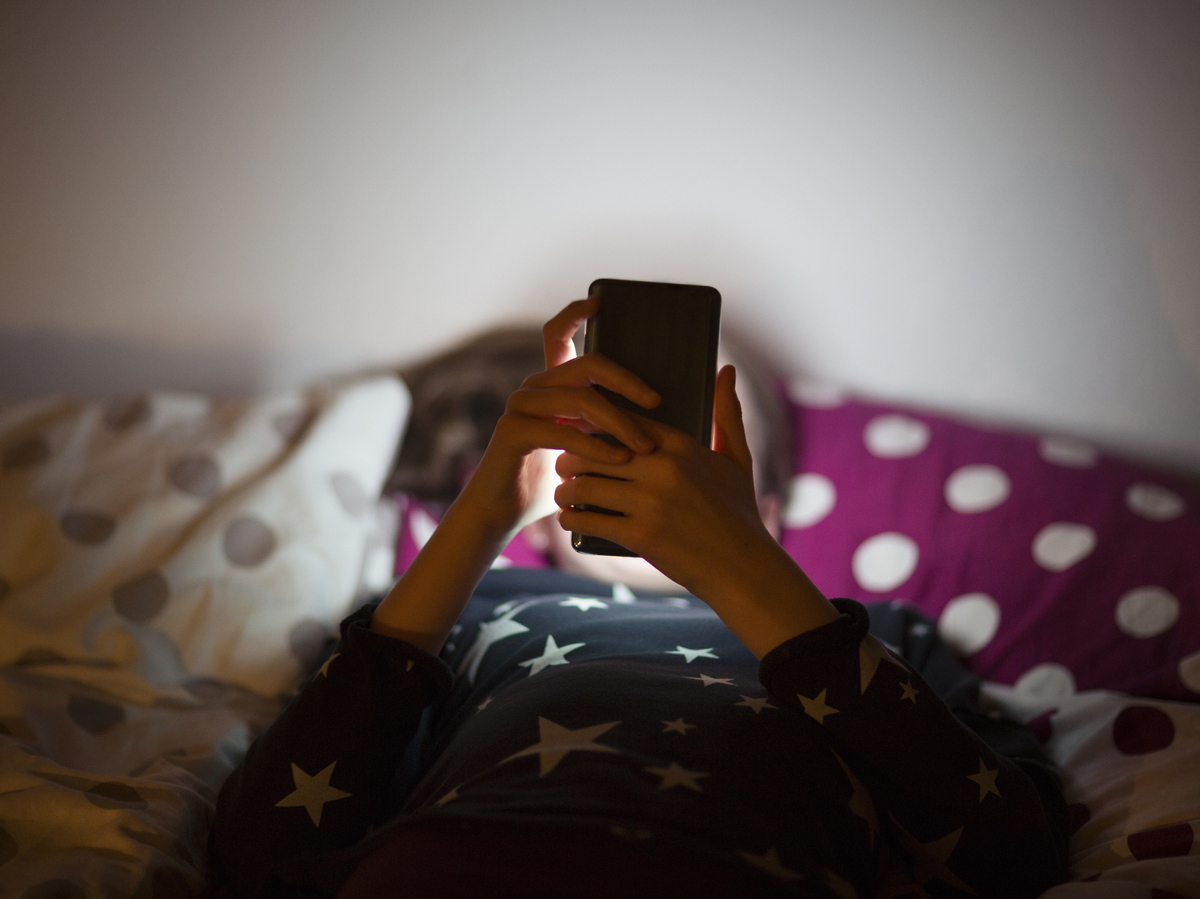
[ad_1]

Are smartphones protected for tweens? Parents ought to concentrate on the dangers, a display screen advisor advises.
Elva Etienne/Getty Images
cover caption
toggle caption
Elva Etienne/Getty Images

Are smartphones protected for tweens? Parents ought to concentrate on the dangers, a display screen advisor advises.
Elva Etienne/Getty Images
Your tween needs a smartphone very badly. So badly that it bodily hurts. And they’re supplying you with soooo many the explanation why.
They’re going to center faculty … they want it to collaborate with friends on faculty tasks … they want it to let you know the place they’re … after they’ll be house … when the varsity bus is late. It’ll assist you, expensive mother or father, they vow. Plus, all their mates have one, they usually really feel neglected. Come on! Pleeeeeeze.
Before you click on “place order” on that smartphone, pause and take into account a couple of insights from an individual who makes a residing serving to dad and mom and tweens navigate the murky waters of smartphones and social media.
Emily Cherkin spent greater than a decade as a center faculty instructor throughout the early aughts. She watched first-hand because the presence of smartphones remodeled life for center schoolers. For the previous 4 years, she’s been working as screen-time advisor, teaching dad and mom about digital know-how.
Her first piece of recommendation about when to present a baby a smartphone and permit them to entry social media was reiterated by different specialists over and over: Delay, delay, delay.
‘I want I knew then what I do know now’
“I have talked to hundreds of parents,” Cherkin explains, “and no one has ever said to me, ‘I wish I gave my kid a phone earlier or I wish I’d given them social media access sooner. Never.”
In reality, dad and mom inform her the other. “I always hear, ‘I wish I had waited. I wish I knew then what I know now,’ ” she says, “because boy, once you give a child one of these devices or technologies, it is so much harder to take it back.”
Smartphones, social media, and video video games create giant spikes in dopamine deep inside a baby’s mind. As NPR has reported, these spikes pull the kid’s consideration to the machine or app, nearly like a magnet. They inform the kid’s mind that this exercise is tremendous important – far more important than different actions that set off smaller spikes in dopamine, reminiscent of ending homework, serving to to scrub up after dinner, and even enjoying exterior with mates.
Thus, dad and mom set themselves up for a relentless battle when a baby begins having their very own smartphone, Cherkin says. “It’s the dopamine you’re fighting. And that’s not a fair fight. So I tell parents, ‘Delay all of it just as long as you can,'” she emphasizes.
That means delaying, not only a smartphone, however any machine, together with tablets, she suggests. By introducing a pill at an early age, even for academic functions, dad and mom can set up a behavior that could be exhausting to interrupt later, Cherkin has noticed.
“A child using a tablet at age 6 to 8 comes to expect screen time after school,” she says. “Flash forward to age 12, and now they have a phone. And when they come home from school, they’re likely engaging with social media, instead of educational videos.”
Neurologically kids’s brains have not developed sufficient to deal with the magnetic pull of those units and the apps on them, says neuroscientist Anne-Noël Samaha on the University of Montreal.
“It’s almost as if you have the perfect storm,” Samaha explains. “You have games, social media, and even pornography and shopping online, and the brains of children are just not yet ready to have the level of self-control needed to regulate their behavior with these activities. Even adults sometimes don’t have enough self-control to do that or handle some of the emotional impact of them.”
Right-size your parenting fears
Parents usually really feel like as soon as their tween begins shifting round extra autonomously via their neighborhood or city extra, the kid wants a smartphone to be protected, Cherkin says. “They may think, ‘Oh, my gosh! My kid is going to be kidnapped on the way to school. They need a phone to call me.’
But Cherkin notes that parents tend to overestimate the dangers of the “actual world.” and underestimate the risks of a smartphone.
“I think our fears are very misplaced,” she says. “We need to think about what is statistically really likely to happen versus what’s really, really unlikely.”
Each yr within the U.S. a few hundred kids are kidnapped by strangers or folks or slight acquaintances, the U.S. Department of Justice reported. Given that fifty million kids, ages 6 to 17, reside within the U.S, the danger of a kid being kidnapped by a stranger is about 0.0002% every year. (By comparability, the danger of being struck by lightning every year is about 0.0001%.)
On the opposite hand, giving a baby a cellphone comes with an entire new set of dangers and risks, Cherkin says. They could be troublesome for some dad and mom to grasp as a result of they might not have a lot first-hand expertise with particular apps, and the brand new threats which might be rising.
Back in March, the nonprofit Common Sense Media surveyed about 1,300 women, ages 11 to fifteen, about their experiences on social media. Nearly 60% of the ladies who use Instagram, and practically 60% of those that use Snapchat, stated that they had been contacted by a stranger that makes them uncomfortable. The similar was true for 46% of those that use TikTok.
Disturbing on-line encounters and influences
The similar survey discovered that these apps usually expose women to content material they discover disturbing or dangerous. For people who use Instagram, TikTok or Snapchat, 12% to fifteen% of ladies see or hear content material associated to suicide, each day. About the identical share additionally stated they see or hear content material about consuming problems, each day as nicely.
An investigation by the Center for Countering Digital Hate additionally discovered proof that content material associated to suicide and disordered consuming is comparatively widespread on TikTok. In the investigation, the nonprofit arrange eight accounts ostensibly by 13-year-old kids. Each person paused on and favored movies about physique picture and psychological well being. Within half-hour, TikTok really helpful content material about suicide and consuming problems to all eight accounts.
In one occasion, this content material started showing in lower than three minutes. On common, TikTok advised content material about consuming problems each 4 minutes to the teenager accounts.
TikTok declined NPR’s request for an interview, however in an electronic mail, a spokesperson for the corporate wrote: “We’re dedicated to constructing age-appropriate experiences, whereas equipping dad and mom with instruments, like Family Pairing, to assist their teen’s expertise on TikTok.”
Emma Lembke, age 20, says these findings line up with what she skilled when she first went on Instagram eight years in the past. “As a 12-year-old girl, I felt like I was being constantly bombarded by bodies that I could never replicate or ones that I could try to, but it would lead me in a darker direction.”
She remembers simply making an attempt to search for a wholesome recipe. “And from that one search, I remember being fed constant stuff about my ‘200-calorie day’ or intermittent fasting.”
Eventually she says, her feed was “covered with anorexic, thin, tiny women. Dieting pills, lollipops to suppress my appetite.”
Lembke developed an consuming dysfunction. She has recovered, and now’s a digital advocate and founding father of the Log OFF challenge, which helps teenagers construct more healthy relationships with social media.
“When I was younger, I was being prodded and poked and fed material [on social media] that was really leading me in a direction toward an eating disorder,” she says. “I think for a lot of young women, even if it doesn’t materialize into a fully fledged eating disorder, it painfully warps their sense of self by harming their body image. “
Instagram’s mother or father firm, Meta, declined a request for an interview. But in an electronic mail, a spokesperson stated the corporate has invested in know-how that finds and removes content material associated to suicide, self-injury or consuming problems earlier than anybody experiences it. “We want to reassure every parent that we have their interests at heart in the work we’re doing to provide teens with safe, supportive experiences online,” they wrote.
A complete world of sexually specific content material
Many kids additionally come throughout sexualized content material, even porn, on social media apps, Cherkin says.
If you need to get a way for what your child would possibly encounter when you allow them to have a cellphone and widespread apps, Cherkin recommends making an attempt this: Set up a check account in one of many apps, setting the age of the person to your kid’s age, after which use the account your self for a couple of weeks.
“I did that with Snapchat. I set up an account, pretending to be 15. Then I just went to the Discover feed, where it pushes content to you based on your age,” she explains. Within seconds, sexualized content material and vulgar photos appeared, she says. “And I thought, ‘No, this is not appropriate for a 15-year-old.”
Snapchat’s mother or father firm, Snap, additionally declined a request for an interview with NPR. A spokesperson wrote in an electronic mail: “We have largely kept misinformation, hate speech, and other potentially harmful content from spreading on Snapchat. That said, we completely understand concerns about the appropriateness of the content that may be featured, and are working to strengthen protections for teens with the aim of offering them a more age-appropriate experience.”
Personally, Cherkin makes use of Instagram for her enterprise. And again in March, regardless of all her data concerning the traps on social media, she says she “got catfished.” She engaged with a stranger who gave the impression to be a teen in her DMs, and ultimately obtained obscene and disturbing photographs of a person’s genitalia.
She writes on her weblog: “It’s graphic. It’s gross. And this is one teeny (lol) example of what kids and teens see ALL THE TIME.”
What’s a mother or father to do? Consider smartphone options
In the tip, Cherkin says, there are a number of different in-between choices for tweens in addition to giving them their very own smartphone or denying them a cellphone altogether. You can:
- Share your cellphone along with your tween to allow them to textual content with and name mates.
- Give your tween a “dumb phone” that solely permits texting and calling. For instance, purchase an old-school flip cellphone. But if that is out of the query as a result of it isn’t cool sufficient (and you’ve got further money to spare), now you can purchase dumb telephones that appear like smartphones however have extraordinarily restricted features – no easy-access to the web, no social media. And little or no threat of inappropriate content material.
Try to restrict the apps your youngster makes use of – however get able to be busy monitoring them
If you do find yourself getting your tween a wise cellphone, Cherkin says, you could be tempted to easily “block” kids from downloading explicit apps on their telephones. And in principle, this works. Parental management apps, reminiscent of Bark, can notify you when an app is put in.
But, she says, many children discover workarounds to this strategy – and actually any parental controls. For occasion, she says, in case you block Instagram on their cellphone, children can login through the online. If you block TikTok, they may watch Tiktok movies in Pinterest. Kids can discover porn on Spotify.
“Kids are way tech savvier than we are,” Cherkin wrote in an electronic mail. “Remember how we used to program the VCR for our parents?! Every single parent who comes to me for help has a variation of this same story: ‘We had X parental controls; we blocked X sites; our child figured out how to access them anyway.’ … It’s impossible to successfully block everything — and once you do, a replacement will pop up in its place.”
In different phrases, when you give your youngster a smartphone, you’ll probably be establishing your self for an entire new sequence of parenting duties and worries. Even Meta reveals this in its April ad for their parental controls: The mother within the advert is monitoring her son’s Instagram account whereas doing the dishes.
[adinserter block=”4″]
[ad_2]
Source link


